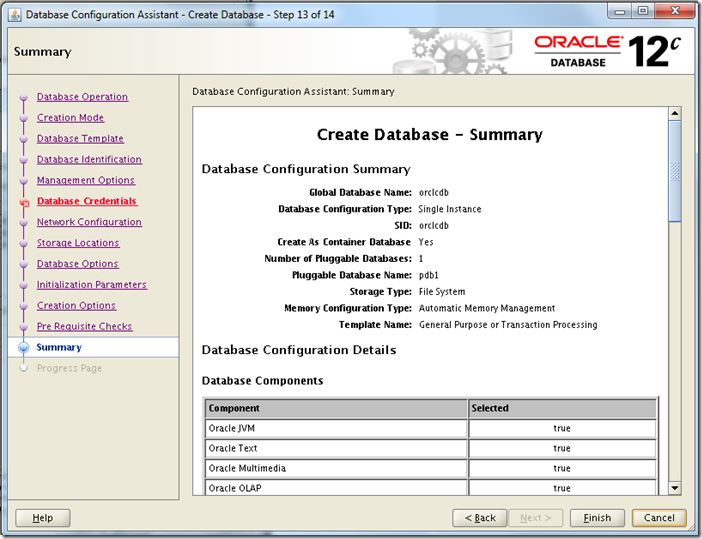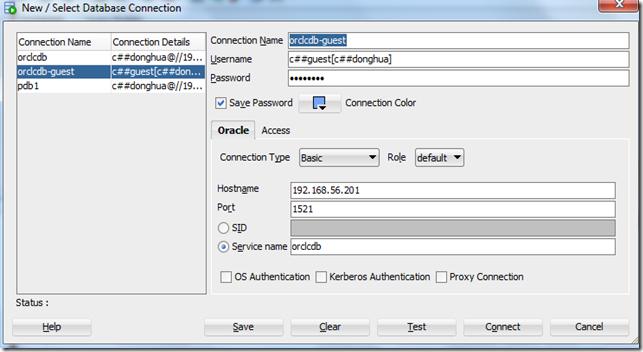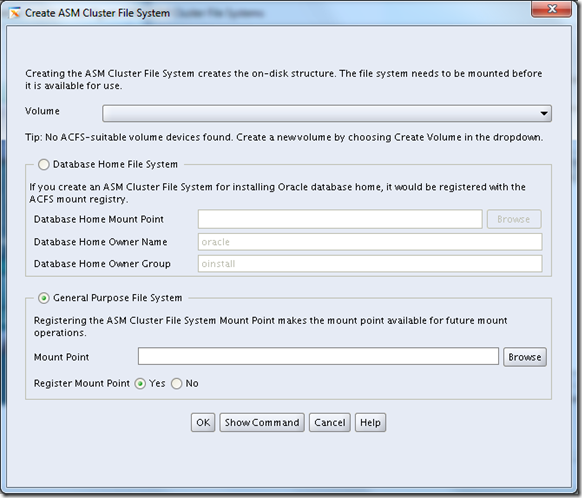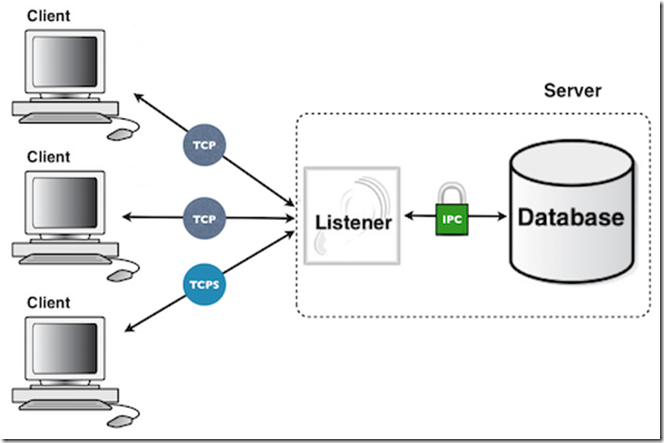Existing configuration:
[oracle@vmxdb01 admin]$ cat listener.ora |grep -v '^#'|grep -v '^$'
LISTENER =
(DESCRIPTION_LIST =
(DESCRIPTION =
(ADDRESS = (PROTOCOL = TCP)(HOST = localhost)(PORT = 1521))
(ADDRESS = (PROTOCOL = IPC)(KEY = EXTPROC1521))
)
)
ADR_BASE_LISTENER = /u01/app/oracle
ENABLE_GLOBAL_DYNAMIC_ENDPOINT_LISTENER=ON # line added by Agent
[oracle@vmxdb01 admin]$ lsnrctl status
LSNRCTL for Linux: Version 11.2.0.4.0 - Production on 02-JUL-2014 21:31:50
Copyright (c) 1991, 2013, Oracle. All rights reserved.
Connecting to (DESCRIPTION=(ADDRESS=(PROTOCOL=TCP)(HOST=localhost)(PORT=1521)))
STATUS of the LISTENER
------------------------
Alias LISTENER
Version TNSLSNR for Linux: Version 11.2.0.4.0 - Production
Start Date 02-JUL-2014 21:13:26
Uptime 0 days 0 hr. 18 min. 24 sec
Trace Level off
Security ON: Local OS Authentication
SNMP OFF
Listener Parameter File /u01/app/11.2.0/grid/network/admin/listener.ora
Listener Log File /u01/app/oracle/diag/tnslsnr/vmxdb01/listener/alert/log.xml
Listening Endpoints Summary...
(DESCRIPTION=(ADDRESS=(PROTOCOL=tcp)(HOST=vmxdb01)(PORT=1521)))
(DESCRIPTION=(ADDRESS=(PROTOCOL=ipc)(KEY=EXTPROC1521)))
Services Summary...
Service "+ASM" has 1 instance(s).
Instance "+ASM", status READY, has 1 handler(s) for this service...
Service "orcl" has 1 instance(s).
Instance "orcl", status READY, has 1 handler(s) for this service...
Service "orclXDB" has 1 instance(s).
Instance "orcl", status READY, has 1 handler(s) for this service...
The command completed successfully
Change the local listener setting
[oracle@vmxdb01 admin]$ sqlplus / as sysasm
SQL*Plus: Release 11.2.0.4.0 Production on Wed Jul 2 21:43:01 2014
Copyright (c) 1982, 2013, Oracle. All rights reserved.
Connected to:
Oracle Database 11g Enterprise Edition Release 11.2.0.4.0 - 64bit Production
With the Automatic Storage Management option
SQL> show instance;
instance "local"
SQL> select instance_name from v$instance;
INSTANCE_NAME
----------------
+ASM
SQL> set lin 85
SQL> select value from v$parameter where name='local_listener';
VALUE
-------------------------------------------------------------------------------------
(DESCRIPTION=(ADDRESS_LIST=(ADDRESS=(PROTOCOL=TCP)(HOST=127.0.0.1)(PORT=1521))))
SQL> alter system set local_listener='(DESCRIPTION=(ADDRESS = (PROTOCOL = IPC)(KEY = EXTPROC1521)))';
System altered.
SQL> select value from v$parameter where name='local_listener';
VALUE
-------------------------------------------------------------------------------------
(DESCRIPTION=(ADDRESS = (PROTOCOL = IPC)(KEY = EXTPROC1521)))
SQL> select instance_name from v$instance;
INSTANCE_NAME
----------------
orcl
SQL> select value from v$parameter where name='local_listener';
VALUE
-------------------------------------------------------------------------------------
(ADDRESS=(PROTOCOL=TCP)(HOST=127.0.0.1)(PORT=1521))
SQL> alter system set local_listener='(DESCRIPTION=(ADDRESS = (PROTOCOL = IPC)(KEY = EXTPROC1521)))';
System altered.
SQL> select value from v$parameter where name='local_listener';
VALUE
-------------------------------------------------------------------------------------
(DESCRIPTION=(ADDRESS = (PROTOCOL = IPC)(KEY = EXTPROC1521)))
Change the listener.ora
[oracle@vmxdb01 admin]$ cat listener.ora |grep -v '^$'
# listener.ora Network Configuration File: /u01/app/11.2.0/grid/network/admin/listener.ora
# Generated by Oracle configuration tools.
LISTENER =
(DESCRIPTION_LIST =
(DESCRIPTION =
(ADDRESS = (PROTOCOL = TCP)(HOST = localhost)(PORT = 1521))
(ADDRESS = (PROTOCOL = IPC)(KEY = EXTPROC1521))
)
)
ADR_BASE_LISTENER = /u01/app/oracle
ENABLE_GLOBAL_DYNAMIC_ENDPOINT_LISTENER=ON # line added by Agent
# SECURE_REGISTER_LISTENER=ipc
# SECURE_CONTROL_LISTENER=ipc
SECURE_PROTOCOL_LISTENER=ipc
[oracle@vmxdb01 admin]$ lsnrctl stop listener
LSNRCTL for Linux: Version 11.2.0.4.0 - Production on 02-JUL-2014 21:51:06
Copyright (c) 1991, 2013, Oracle. All rights reserved.
Connecting to (DESCRIPTION=(ADDRESS=(PROTOCOL=TCP)(HOST=localhost)(PORT=1521)))
The command completed successfully
[oracle@vmxdb01 admin]$ lsnrctl start listener
LSNRCTL for Linux: Version 11.2.0.4.0 - Production on 02-JUL-2014 21:54:01
Copyright (c) 1991, 2013, Oracle. All rights reserved.
Starting /u01/app/11.2.0/grid/bin/tnslsnr: please wait...
TNSLSNR for Linux: Version 11.2.0.4.0 - Production
System parameter file is /u01/app/11.2.0/grid/network/admin/listener.ora
Log messages written to /u01/app/oracle/diag/tnslsnr/vmxdb01/listener/alert/log.xml
Listening on: (DESCRIPTION=(ADDRESS=(PROTOCOL=tcp)(HOST=vmxdb01)(PORT=1521)))
Listening on: (DESCRIPTION=(ADDRESS=(PROTOCOL=ipc)(KEY=EXTPROC1521)))
Connecting to (DESCRIPTION=(ADDRESS=(PROTOCOL=TCP)(HOST=localhost)(PORT=1521)))
TNS-12564: TNS:connection refused
TNS-01194: The listener command did not arrive in a secure transport
Connecting to (DESCRIPTION=(ADDRESS=(PROTOCOL=IPC)(KEY=EXTPROC1521)))
STATUS of the LISTENER
------------------------
Alias listener
Version TNSLSNR for Linux: Version 11.2.0.4.0 - Production
Start Date 02-JUL-2014 21:54:01
Uptime 0 days 0 hr. 0 min. 8 sec
Trace Level off
Security ON: Local OS Authentication
SNMP OFF
Listener Parameter File /u01/app/11.2.0/grid/network/admin/listener.ora
Listener Log File /u01/app/oracle/diag/tnslsnr/vmxdb01/listener/alert/log.xml
Listening Endpoints Summary...
(DESCRIPTION=(ADDRESS=(PROTOCOL=tcp)(HOST=vmxdb01)(PORT=1521)))
(DESCRIPTION=(ADDRESS=(PROTOCOL=ipc)(KEY=EXTPROC1521)))
The listener supports no services
The command completed successfully
[oracle@vmxdb01 admin]$ lsnrctl status
LSNRCTL for Linux: Version 11.2.0.4.0 - Production on 02-JUL-2014 21:56:09
Copyright (c) 1991, 2013, Oracle. All rights reserved.
Connecting to (DESCRIPTION=(ADDRESS=(PROTOCOL=TCP)(HOST=localhost)(PORT=1521)))
TNS-12564: TNS:connection refused
TNS-01194: The listener command did not arrive in a secure transport
Connecting to (DESCRIPTION=(ADDRESS=(PROTOCOL=IPC)(KEY=EXTPROC1521)))
STATUS of the LISTENER
------------------------
Alias listener
Version TNSLSNR for Linux: Version 11.2.0.4.0 - Production
Start Date 02-JUL-2014 21:54:01
Uptime 0 days 0 hr. 2 min. 7 sec
Trace Level off
Security ON: Local OS Authentication
SNMP OFF
Listener Parameter File /u01/app/11.2.0/grid/network/admin/listener.ora
Listener Log File /u01/app/oracle/diag/tnslsnr/vmxdb01/listener/alert/log.xml
Listening Endpoints Summary...
(DESCRIPTION=(ADDRESS=(PROTOCOL=tcp)(HOST=vmxdb01)(PORT=1521)))
(DESCRIPTION=(ADDRESS=(PROTOCOL=ipc)(KEY=EXTPROC1521)))
Services Summary...
Service "+ASM" has 1 instance(s).
Instance "+ASM", status READY, has 1 handler(s) for this service...
Service "orcl" has 1 instance(s).
Instance "orcl", status READY, has 1 handler(s) for this service...
Service "orclXDB" has 1 instance(s).
Instance "orcl", status READY, has 1 handler(s) for this service...
The command completed successfully
Fix error message TNS-01194 by putting the IPC address as the first address in the listener
[oracle@vmxdb01 admin]$ cat listener.ora |grep -v '^#'|grep -v '^$'
LISTENER =
(DESCRIPTION_LIST =
(DESCRIPTION =
(ADDRESS = (PROTOCOL = IPC)(KEY = EXTPROC1521))
(ADDRESS = (PROTOCOL = TCP)(HOST = localhost)(PORT = 1521))
)
)
ADR_BASE_LISTENER = /u01/app/oracle
ENABLE_GLOBAL_DYNAMIC_ENDPOINT_LISTENER=ON # line added by Agent
SECURE_PROTOCOL_LISTENER=ipc
After restart the listener, the message TNS-1194 disappeared.
[oracle@vmxdb01 admin]$ lsnrctl status
LSNRCTL for Linux: Version 11.2.0.4.0 - Production on 02-JUL-2014 22:01:40
Copyright (c) 1991, 2013, Oracle. All rights reserved.
Connecting to (DESCRIPTION=(ADDRESS=(PROTOCOL=IPC)(KEY=EXTPROC1521)))
STATUS of the LISTENER
------------------------
Alias listener
Version TNSLSNR for Linux: Version 11.2.0.4.0 - Production
Start Date 02-JUL-2014 21:56:48
Uptime 0 days 0 hr. 4 min. 52 sec
Trace Level off
Security ON: Local OS Authentication
SNMP OFF
Listener Parameter File /u01/app/11.2.0/grid/network/admin/listener.ora
Listener Log File /u01/app/oracle/diag/tnslsnr/vmxdb01/listener/alert/log.xml
Listening Endpoints Summary...
(DESCRIPTION=(ADDRESS=(PROTOCOL=ipc)(KEY=EXTPROC1521)))
(DESCRIPTION=(ADDRESS=(PROTOCOL=tcp)(HOST=vmxdb01)(PORT=1521)))
Services Summary...
Service "+ASM" has 1 instance(s).
Instance "+ASM", status READY, has 1 handler(s) for this service...
Service "orcl" has 1 instance(s).
Instance "orcl", status READY, has 1 handler(s) for this service...
Service "orclXDB" has 1 instance(s).
Instance "orcl", status READY, has 1 handler(s) for this service...
The command completed successfully
![sa_ipc60 sa_ipc60]()













